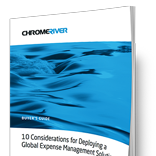We recently talked about how to keep your business travellers happy while maintaining cost control and avoiding expenses spiraling out of control. One of the biggest challenges many companies face is that those who travel the most are more likely to have specific preferences (hotel chains, airlines, etc.) that may not tally with your organisation’s negotiated rates. While this can lead to friction, there are several ways that can both make your road warriors happier and more productive, and also keep the CFO smiling.
Related: How Can You Maximize Expense Policy Compliance and Maintain Traveller Happiness?
One of the biggest peeves among road warriors is the amount of time spent (i.e. wasted) in airports. Whether it’s waiting for that family with four kids to slowly work their way through the security check point; eating overpriced food while trying to work on your 30 minutes’ free Wi-Fi; or struggling to find a pen to fill in your customs form while standing in the endless immigration line, productivity levels diminish while anger levels increase.
Here are three ways that organisations can make their frequent fliers happy, while also enabling them to spend more time doing what they’re paid to do.
TSA Pre-check
TSA Pre-check is a U.S. Government trusted traveler program that can drastically decrease the amount of time needed to go through security. Members no longer need to remove shoes, belts or coats, and can also leave their laptops and clear liquid bag. Also, as there are still relatively few people with TSA Pre-check clearance, there will be relatively few people in the dedicated security lines in the airport.
In order to register, submit an application online, schedule an in-person appointment for a background check and fingerprint. Once approved, you will get a Known Traveller Number that you simply need to add to your ticket when you book. At £85 for five years, it’s a real bargain, and it can save anything up to 45 minutes to an hour each time you fly, so you don’t have to leave for the airport as early.
Global Entry
Global Entry is another U.S. Government trusted traveler program, designed specifically for international travellers. It allows members (who must be U.S. citizens, permanent residents or citizens of a select few countries) to bypass immigration lines, and also avoid having to fill out customs forms. When you’re registered, you will simply go to a kiosk at the side of the immigration hall, place your ID card / passport on a reader and scan your fingerprints. You can also fill out your customs declaration at the kiosk.
Again, it requires a bit of effort to join, as you need to go for an in-person background check. However, it’s also a very cost-effective program (£125 for five years) and can easily save upwards of 30 minutes each time you enter the U.S.
Related: Expense best practices to delight your employees AND your CFO
Airport lounge passes
While the first two items are designed to minimise the time spent in an airport, it’s also possible to maximise the benefits of time spent waiting for your plane.Although elite airline status and expensive business or first class tickets can come with airport lounge access, for those on economy tickets or low status, the packed departure gate is often the only choice. However, there are several ways that travellers can gain access to these lounges. Some airlines allow day passes to be purchased for around £60. However, that can soon add up for frequent fliers.
Two alternatives are to invest in a lounge membership with an airline (typically £400-£600 per year), or go with an organisation that has its own clubs in airports worldwide (also about £600 per year). While expensing these passes may be a hard sell to the CFO, if you travel a lot, the financial benefits can soon add up. The lounges have free Wi-Fi and more space to work, which beats the heck out of balancing your laptop on your knee, while sitting on the floor next to an outlet, while struggling through patchy cell coverage or expensive Wi-Fi plans.
In addition, lounges offer free soft / alcoholic drinks and food. While some lounges’ food is mainly snacks such as fruit and pretzels, others can provide a full meal, which can save £20 each time, all while providing a much more relaxed dining atmosphere (I can personally attest to United’s Heathrow lounge doing an excellent English breakfast!).
Allowing travellers to complete another hour of work while cutting out airport dining expenses can save several hundred dollars per year, so for frequent fliers, the upfront cost could even itself out.
Whether it’s a trip to a far flung beach this summer, or more business trips, happy travels!
Search
Subscribe
Latest Posts
- UK Finance Leaders Reveal Biggest Concerns for the Post-COVID Recovery
- 9 Signs it’s Time to Switch Expense Management Systems
- Gartner and Ardent Partners Advise How to Build a Best-in-class Accounts Payable Operation
- When Cash (Control) is King: Is Your Accounts Payable Strategy Optimised for a COVID-19 World?
- Getting the Most Out of Your Spend Data with Emburse Insight Advisor
Posts by Category
Our choice of Chrome River EXPENSE was made in part due to the very user-friendly interface, easy configurability, and the clear commitment to impactful customer service – all aspects in which Chrome River was the clear winner. While Chrome River is not as large as some of the other vendors we considered, we found that to be a benefit and our due diligence showed that it could support us as well as any large players in the space, along with a personalized level of customer care.
We are excited to be able to enforce much more stringent compliance to our expense guidelines and significantly enhance our expense reporting and analytics. By automating these processes, we will be able to free up AP time formerly spent on manual administrative tasks, and enhance the role by being much more strategic.
